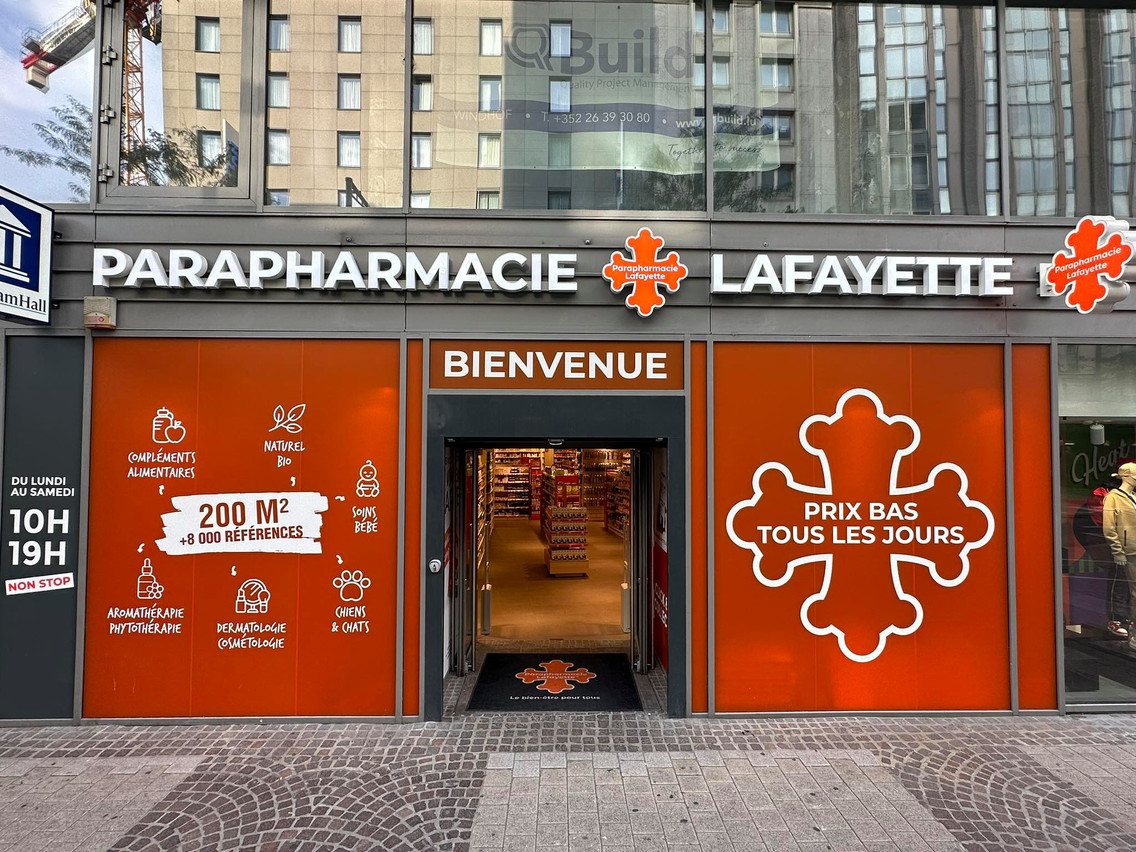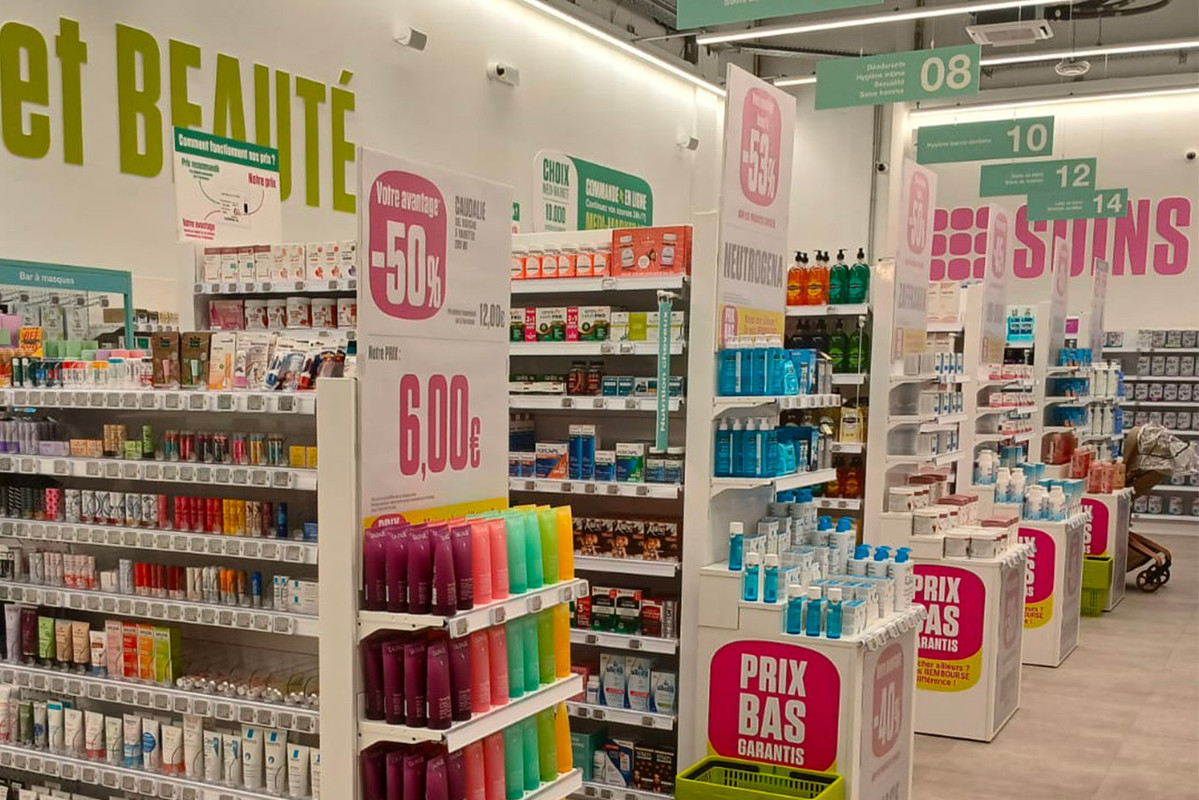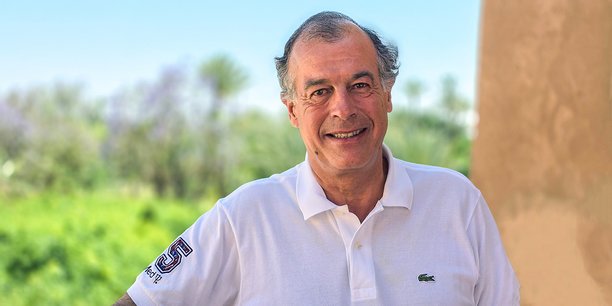Tens of thousands of references with prices that defy all competition, or at least those of pharmacies: the recipe is a success in the Belux. Medi-Market, crowned Belgian Company of the Year 2023, has just opened its 10e store in Luxembourg, in the Opkorn shopping center in Differdange. An additional branch for a strengthened network of the Luxembourg territory, after Belgium. The ‘discount model’ of parapharmacy, long disparaged by pharmacists, has been democratized and inspired by the methods and codes of mass distribution.
The company, launched in 2014, wanted to end a form of pharmacy monopoly on over-the-counter products, which charged higher prices. “From the start it was a disruptive concept, devised by my predecessor Yvan Verougstraete, whom I replaced two to three years ago. We wanted to change this phenomenon with a concept that brings together health and well-being under one roof, with a wide range of references at the best price: on average 20% lower than that of traditional pharmacies. We have also developed several concepts: classic pharmacies, drugstores and beauty salons,” recalls the company’s CEO, Cédric Antoine. Attractive prices made possible by large volume orders, for the brand with 140 points of sale spread across Belgium, Luxembourg and Italy.
Medi-Market was born in the struggle, because in a sector it is never pleasant to see a competitor arrive and develop.
Unlike Belgium, no medicines are sold on the Luxembourg and Italian markets: only parapharmacies are used. “It is commercially easier to develop a network of pharmacies because in most countries the number of pharmacies is regulated. But it is clear that we are a player that also has legitimacy in the development of the pharmacy division,” says Cédric Antoine, according to whom the establishment on the Luxembourg market was very natural.
“There is often still a commercial correlation between Belgium and Luxembourg. We are in a country where the configuration of pharmacies was somewhat similar to that of Belgium: rather small local pharmacies, and not large spaces like the ones we are developing, where we bring together a very attractive and competitive offer with a good range of brands, and which, in our opinion, make the difference today,” explains this good expert on the Luxembourg market, previously commercial director of the Cora shopping center in Foetz.
Position yourself as a destination store
After ten years of activity, the initial skepticism seems to have disappeared, according to Cédric Antoine. “Medi-Market was born in the struggle, because in a sector it is never pleasant to see a competitor arrive and develop. Pharmacists realized, if they will admit it, that we were bringing in a new customer base by positioning ourselves as a destination store. With them it is a combination of know-how,” defends Cédric Antoine.
A destination store is an outlet perceived as a place to visit or relax, for which consumers, because of its offering or because of its attractiveness, are willing to travel a long distance solely to make purchases there. “Instead of fighting on our strengths, pharmacists can focus on their work: selling medicines, advising patients and developing new skills, such as vaccination or different types of screening. Healthcare professions are transforming and this opens up new possibilities, meaning we no longer focus on this ‘combat side’ where everyone is afraid of the other. The water has flowed under the bridges,” continues Cédric Antoine.
Contacted to find out the pharmacists’ position, the president of the Pharmacists’ Union and boss of the Pharmacie du Cygne, Alain de Bourcy, declined to comment on the subject, “neither as president nor as a pharmacist”.
The competition is also played online
Direct competitor that shares Medi-Market’s position: parapharmacy Lafayette, Avenue de la Gare, opened in the summer of 2023. “When I arrived, I didn’t just make friends. I looked a bit like the man who was murdered between three pharmacies. Now Medi-Market is also present, exactly the opposite. And pharmacists understood that they had to adapt. For example, we know that if a McDonald’s opens somewhere, a Burger King is never far away. I think competition can stimulate the market, customers go to both and compare. We attach importance to high-quality service, so that people are well advised and informed, because in my opinion this is the basis of success. That’s why I think Medi-Market is good competition. Our range includes items that one or the other does not make, I think we are quite complementary,” says Mikaël Wallerich, the manager of Lafayette, whose recipe is also a success in France, with a model similar to its Belgian neighbor.
The population is increasingly paying attention to what they do, of course in relation to the price, but also by paying attention to the quality of the products.
Launched 15 years ago, Lafayette’s emergency pharmacies have also established their reputation thanks to low prices, a range expanded to tens of thousands of products and the importance placed on advice and experience. 250 points of sale cover the territory of France, with, like Medi-Market, an online offer for omnichannel distribution. The online presence is a channel through which certain Luxembourg pharmacies bank, such as Pharmacie Gillain with mapharcie.lu, Pharmacie du Globe, Steinfort or even Pétange.
Between consciousness and #frenchpharmacy
In this success that both brands share, “the price is not the only part”, the Belgian boss supports. The wide product range and emphasis on advice also do not fully explain the recipe for success of cheap drugstores. “There has been a change in mentality since Covid. Health has come to the fore again. We have citizens who understand that health capital is important and that we must learn to understand it, care for it and respect it. I think this is a phenomenon of social transformation that will happen in the long term. As healthcare stakeholders, we are alert to this,” notes Cédric Antoine.
A change that is also observed by the competitor. “I think the population is paying more attention to what they do, whether it is about price of course, but also in terms of hygiene and nutrition, paying attention to the quality of the products. The consumption pattern has changed,” says Mikaël Wallerich.
“There is an awareness and, as with scoring for food products, it is not excluded that one day there will be something similar for health, to know the impact of products on health. Because we are also moving towards a society in which health will no longer only be a curative, but also a preventive domain: taking care of your body, your skin, your sleep, your well-being… It is something that becomes part of the customs and which will take up more and more space,” continues Cédric Antoine. Moreover, there are at least ten applications for recording the composition of products after scanning them.

Using the same strategies as the Belgian model, the French para-pharmacy model in Lafayette has 250 points of sale in France and one in Luxembourg, Avenue de la Gare. (Photo: Mikaël Wallerich)
Can also be placed in the box of social developments: social networks as a promotional tool may also explain the reasons for this success, with more and more influencers praising the merits of slightly more expensive products that can be found in drugstores. This is what we call the “French pharmacy” phenomenon, referring to the global craze observed on social networks for beauty and skin care products, especially those sold in French pharmacies. A phenomenon that symbolizes an approach to beauty that focuses on quality, effectiveness and accessibility, the trio that Medi-Market and Lafayette rightly rely on.
And both aren’t done riding the wave yet. Medi-Market still has ambitions for the Luxembourg market. “We have gradually become the market leader in our market in Belgium with a market share of 18%. I don’t know the exact market share on the Luxembourg market, but we have also become a reference, with stores that are popular with customers and that are doing well. Our satisfaction index, measured by an independent method, shows a net promoter score of 68, which is very high in our distribution sector, so we are very proud,” says Cédric Antoine, who does not rule out that he will also develop Medi-. Market beauty institutes, such as in Belgium.
“It depends a lot on the size of the projects we develop, because we are always tenants of our space and have limitations. In our institutes, we have traditionally started offering technology-based treatments such as permanent hair removal and weight loss programs. Today we are working on expanding this offer and when we have developed a truly complete mix, we will undoubtedly also want to implement it in Luxembourg,” he suggests. In the meantime, projects for new drugstores are still being studied: “It is possible that four or five flagship projects will emerge in the country in the coming months and years.”
The boss of drugstore Lafayette is also considering the developments, but at a slower pace, “time to fully understand the market”. This summer the brand is celebrating its first anniversary. “The initial assessment is positive for the time being, we meet the forecast, we are even slightly above it. But it will take two to three years before we can have the same statistics as in France. For the future, I do not plan to go into pharmacy at all, but to develop parapharmacy, and later why not optics and medical equipment, like the French model,” predicts Mikaël Wallerich.






